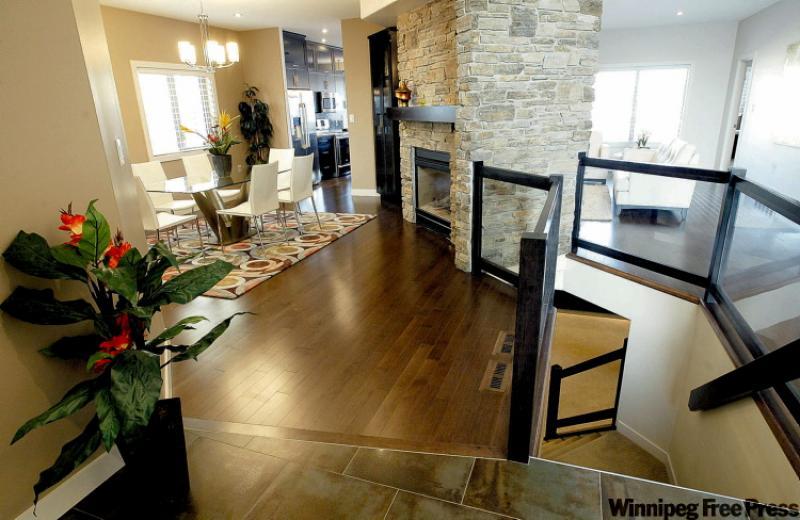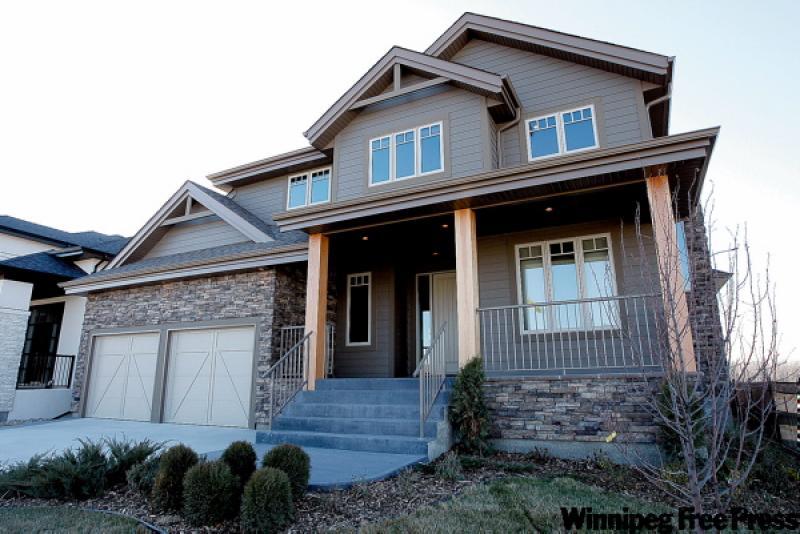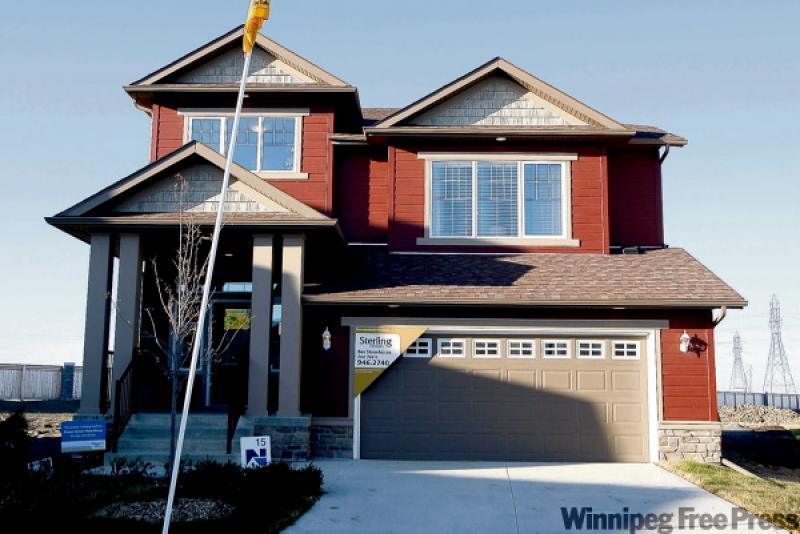New Homes
New Homes
Single family home starts bouncing back
We reported last week resale home sales in Winnipeg for the month of November increased a whopping 42 per cent over the same month last year.
We also indicated the new-home market is heavily dependent upon used market sales to stimulate starts and the purchase of new homes. What we didn't know was whether that would be seen in new-home starts in November.
We are pleased to report single family detached home starts in Winnipeg in November increased 44.2 per cent in 2009 from 2008. The latest statistics from Canadian Mortgage and Housing Corp. indicate the single family detached segment of the new home market is in the process of rebounding from an early year slump.
Hopefully, it will also continue to reflect the close affiliation between used-home sales and new-home starts.
CMHC senior market analyst Jeff Powell commented the November surge, which followed a positive October, suggested the improving market for single family detached homes. Of course, let's also give credit to an unseasonably balmy November, which permitted elevated construction levels.
After having an essentially washed-out spring, it was definitely our turn to catch a break in the weather. Even though the temperature has dropped considerably this month, work is still proceeding at full pace.
The successful Fall Parade of Homes was also a significant contributor to the upswing in starts. Although most of the interest will be reflected in post-Parade sales and starts in the new year, there were a number of builders able to take advantage of the extended fall season.
Although the single family market is on the upswing, multi-family starts continue to lag behind last year's pace. This was projected a year ago and, although disconcerting, adjustments are being made accordingly.
A multi-unit project tends to be considerably larger in scale, whether it be an apartment building or a series of condominiums. Therefore, unless the builder is confident of a large percentage of pre-sold units, he would not venture into this type of new project.
There was also an inventory of units available from the 2008 construction season. Therefore, the demand was not as high in 2009.
Saying that, if the starts and sales trends continue to move in the current positive direction, consumers can anticipate an increase in multi-family starts sometime next year and into 2011. With the record low apartment vacancy rate in Winnipeg, this segment cannot stay dormant for too long.
Similarly, the condo lifestyle continues to increase in demand and there are a variety of projects throughout the city on the drawing board.
Given the economic hardships the entire country experienced in late 2008 and early 2009, new home start numbers will certainly show an overall decline when the final figures for the year become available in early January.
However, another positive month will certainly go a long way in re-establishing consumer confidence and the strength and resilience of the residential construction industry in Manitoba.
Mike Moore is president of the Manitoba Home Builders' Association
New Homes
House prices surge, even during recession
If you've been investing in real estate over the last couple of years, it was a wise decision.
With the economic downturn, recession and fears about the future, real estate is the one area that's proven to be a safe investment, according to the latest market report released by RE/MAX earlier this month.
The RE/MAX Housing Market Outlook for 2010 predicts both the number of home sales and average prices will show increases in most major cities across the country. That's a sharp contrast from our neighbours down south, who are still facing a slow and depressed real estate market in the U.S. The Canadian report examined real estate trends in 23 markets to provide an outlook for the coming year.
Real estate sales are forecast to recover in almost all major centres by the end this year. Markets around the country that have been hit by the recession and suffered declines in sales and price have turned around. Leading the pack in the recovery race is Greater Vancouver, which is anticipated to have a 45 per cent increase in housing sales. Ottawa and Quebec City are both expected to reach historic highs for the number of homes sold.
"2009 was without question the year of the house," says Michael Polzler, Executive Vice President, RE/MAX Ontario-Atlantic Canada. "Real estate not only defied industry and analysts' predictions in 2009, its performance went well beyond the realm of expectation by boosting consumer confidence levels and ultimately kick-starting the national economic engine."
Prices have also been on the upswing. The average price in 65 per cent of markets will post new records in 2009, according to the RE/MAX report. That's in line with the country's economic performance.
For 2010, 83 per cent of the markets surveyed, or 19 out of 23, are expecting housing sales to increase over 2009 levels. House prices are also forecast to rise -- a whopping 91 per cent of the markets, or 21 out of 23 cities participating in the survey, are expecting housing prices to escalate next year.
According to RE/MAX, Canadian housing values are forecast to hit an average price of $318,000 at the end of 2009. That's an increase of five per cent from $303,594 in 2008. For 2010, the average price for a home in Canada is expected to reach a record level, rising two per cent from 2009 to reach $325,000.
On a local level, the average price of a home in Manitoba continues to climb. The average house price was $204,606 in October 2009, according to figures provided by the Canadian Real Estate Association (CREA). That's an increase of almost $20,000 from last year, when the average price in October 2008 was $185,558.
Even though I've bought and sold a few houses over the last decade, I'm still surprised every time I see those rising values. Put into perspective, I bought my first house in 1997. Ten years later, I paid exactly $100,000 more for a house that was almost half the size. And now, two years later, my house is likely worth even more (at least I'm hoping it is!). While Winnipeg is still at the low end compared to prices in many other Canadian cities, we've come a long way in a short time.
Year over year, Winnipeg is expected to show a five per cent increase in average house prices by the end of 2009. That's the same level of increase predicted for Ottawa and the Greater Toronto area.
"Some of the greatest percentage gains were reported in Western Canadian markets in 2009 -- demonstrating the higher the peak, the lower the valley," says Elton Ash, regional executive vice-president, RE/MAX of Western Canada. "That said, the recession barely registered on year-over-year activity in most major centres."
Across the country, the average price for a home is forecast to rise in 15 of the 23 markets surveyed. Surprisingly, St. John's, N.L. tops that list with a 15 per cent increase in average price predicted. Quebec City's average price is expected to rise eight per cent, Regina's seven per cent and Saint John, New Brunswick six per cent.
According to RE/MAX, a number of factors will help boost the Canadian real estate market in 2010. Improved economic conditions, continued low interest rates and rising consumer confidence are all factors that will boost activity in the housing market.
"The economic fundamentals in place going forward ideally position the 10 provinces, and the sector overall, for further growth," says Ash.
Whether you're a savvy real estate investor or just a simple home owner, the future looks bright. Stay tuned as we head into 2010.
New Homes
November home sales figures strong
The Winnipeg Realtors Association released its November sales figures on Tuesday and it was good news all around. There was an increase of 42 per cent from the same period last year. The number of properties sold represented the second-best year on record, behind only 2008.
Many people would question what the resale market has to do with the new-home market. Some would even consider it the competition, and think that more resales would hurt new home sales. Nothing could be further from the truth.
The new-home and used-home markets work hand in hand for the benefit of both. A typical pattern in Manitoba is that the owner needs to be able to sell his current home in order to step up to a new home. Therefore, the more used-home sales, the greater the opportunity to sell new homes.
The fact that resale homes are moving faster and frequently above list price gives the new-home buyer additional leverage when looking for that perfect new dream home. A flat market would mean people are staying where they are and are not interested in moving. Resale activity indicates that there is mobility in the market and that all options are open for consideration.
Apartment vacancy rates in Winnipeg are under one per cent and the lowest in Canada. With mortgage rates as low as they are, buying is an extremely attractive option. The average resale-home price for the past two months was slightly over $215,000, most in established neighbourhoods with few options to build new.
In 2008, the average price of a new home in Manitoba was $349,000. New homes tend to be in new neighbourhoods in newer subdivisions. With the equity of selling your existing home (two-thirds the price of the average new home) with current mortgage rates (around four per cent), moving up to a new home has never been easier.
The Winnipeg Realtors Association and the Manitoba Home Builders' Association work very closely in monitoring the market and promoting housing affordability to consumers. In the next week, Canada Mortgage and Housing Corp. will release November numbers for new-home starts in Manitoba and Winnipeg, with 2010 projections.
It will be interesting to see if the jump in existing home sales has an immediate positive effect in new-home starts and continued new construction in 2010. We're betting that it will.
Mike Moore is president of the Manitoba Home Builders' Association.
New Homes
Throne speech may be good news for trades, homeowners
Premier Greg Selinger opened the fall session of the Manitoba Legislature with the throne speech on Monday, and there were a few items that may have a direct impact on housing and renovations.
The government announced the development of legislation to support "granny suites," an attached residence on a dwelling for an elderly parent. Manitobans are definitely living longer now, and having a parent move in with their children may be a viable solution.
However, if you're considering some form of attached residence, addition or significant alteration to your existing residence, contact a professional.
Optimize the work to be done not just for the time that the parent is living with you, but also for that inevitable time when the suite becomes vacant or when you sell your home. A professional RenoMark renovator can help you with that process.
On other throne speech matters, the current version of the Manitoba Condominium Act has been in effect since September 1, 2006. The Manitoba Home Builders' Association has been in consultation with the Finance Department and Consumer and Corporate Affairs reviewing possible changes and upgrades to the act that will benefit all Manitobans, both consumers and builders alike.
As well, the throne speech contained a couple of references to addressing the skills shortage in Manitoba, an issue mentioned frequently in this column.
With a forecasted shortfall of 10,000 skilled tradespeople in the construction industry over the next eight years, it's hoped that the Economic Advisory Council will address the skills shortage and expedite the movement of skilled trades to our province.
One item announced Monday that may not appear on everyone's radar screen is the giving of authority to municipalities to seize vacant or derelict buildings. If applied to derelict houses or commercial buildings in an area that could be rezoned as residential, this legislation could bring new life to neighbourhoods that are now decaying.
Trying to fix a neighbourhood one house at a time is an agonizingly slow process. Areas that are dominated by vacant or derelict buildings need a complete overhaul, not a Band-aid. This legislation could be the start of something huge in our community.
If this is an olive branch being extended to other levels of government and the private sector and it's backed up by all of the necessary tools to make a real difference, we all need to seize it.
Mike Moore is president of the Manitoba Home Builders' Association.
New Homes
The time is right to buy a new home
Numerous people are expressing interest in buying a new home. Attendance at the Fall Parade of Homes had never been higher. However, as frugal Manitobans, we want to make sure that the timing is right and that we are optimizing when the best time to buy might be.
Consider the following rationale when making that decision:
It was only one generation ago (1981) when motrgage interest rates were over 20 per cent. Currently, a 5 year fixed mortgage is available at 4.35 per cent. It cost more to carry a $200,000 loan in 1981 than it does to carry a $500,000 mortgage today. They are also safe rates. Once again, the Canadian banking system was voted as the best in the world. There is no danger of us replicating the American situation.
Manitoba’s unemployment rate is one of the lowest in Canada. Our diversified economy ensures that even when one sector weakens, there is more than enough support from other areas to carry the economy. Our economy is strong and there are still shortages in numerous professions.
Home values in Manitoba have not depreciated for decades. Every year, homes have increased in value consistently. Market fluctuations have not impacted the value of your home. Saying that, one shouldn’t think of their home as a financial investment, but rather a lifestyle investment.
By choosing a new home in a newly developing neighbourhood, you are choosing new friends, schools and community clubs.
And, once again, Manitoba new homes were named as the most energy efficient in Canada. As well, since 1990, GHG emissions in Canada have increased 21.7 per cent. Over the same time period, the number of households in Manitoba has increased by 13.2 per cent. However, the energy efficiency of Manitoba homes has increased by 21.6 per cent. Between 1990 and 2005, GHG emissions in Manitoba homes have been cut by 31.3 per cent.
Homes built since 2001 require less than half the space heating energy of older homes, despite being larger in size. The Manitoba residential construction industry is proactive on energy issues, not reactive.
Winnipeg has the oldest housing stock in Western Canada and the third oldest in all of Canada, behind only Montreal and Halifax. New homes built in Winnipeg are built to last.
So, if you are considering the purchase of a new home but are wondering if the timing is right, there¹s no need to ponder any further. There has never been a better time to buy a new home. The time is now.
Mike Moore is president of the Manitoba Home Builders’ Association
New Homes
Skilled labour shortage affects Manitoba construction
Last week, this column focused on the skilled labour shortage in the construction industry and how the newly formed Manitoba Construction Sector Council was conducting workshops to address this problem.
There's never one easy solution to a problem of this magnitude, but the MCSC is pulling out all the stops to try to resolve it.
The Manitoba Construction Sector Council (www.mbcsc.com) is comprised of five partners: The Construction Association of Rural Manitoba, the Manitoba Building and Construction Trades Council, the Manitoba Heavy Construction Association, the Manitoba Home Builders' Association and the Winnipeg Construction Association.
The MCSC operates within the Alliance of Manitoba Sector Councils and its officers are John Schubert (Chair), Gord Lee (Vice-Chair) and Dave Martin (Secretary-Treasurer). Taras Luchak is the Executive Director.
The mandate of MCSC is to assist Manitoba's construction sector by consulting industry stakeholders and offering solutions to their current and future human resource needs. The council's primary goal is to upgrade skills throughout the industry.
Efforts will also be made to enhance the image of the industry and the benefits of working in the construction sector, with emphasis on attracting individuals from nontraditional groups. These are indeed lofty targets but critical to the welfare of the industry.
Three construction training projects have already been approved by the MCSC board of directors and are moving ahead at different paces. They are the Pre-Employment Construction Training Program, the On the Job Mentorship Program and the Supervisor Development Program.
The first one that they hope to commence is the Pre-Employment Construction Training Program, as early as next January. This program is aimed at recruiting the unemployed, underemployed and underrepresented into the construction industry. The course is designed to be 12 weeks long and includes essential skills, safety training, hand and power tools and practical work site experience. The goal is for successful graduates of the course to step directly into construction jobs.
The Manitoba Construction Sector Council hopes to be able to advertise the program soon, closely followed by interviews and selection of the successful applicants. The first class is limited to 16 participants.
This will hopefully be the first step in the creation of numerous full-time jobs in Manitoba's construction industry.
Mike Moore is president of the Manitoba Home Builders' Association.





